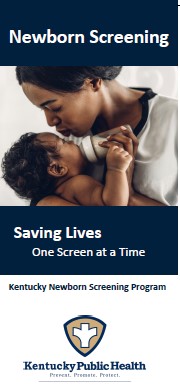The Newborn Screening Program helps determine if a baby has certain health disorders. A healthy newborn can have serious metabolic or genetic disorders that cannot be detected without specific screening. If left undetected and untreated, these disorders can lead to slow growth, blindness, brain damage or possibly death.
Your newborn should be screened 24 hours after birth or before leaving the hospital. The screening process involves a collection of blood from your baby’s heel, pulse oximetry for critical congenital heart disease (CCHD) and hearing tests.
For more information on the heel stick for the newborn screening, watch
What to Expect From Your Baby's First Test provided by
Baby's First Test website.
For more information on pulse oximetry testing for CCHD watch
Pulse Ox for Newborns.
 Newborn Screening Brochure
Newborn Screening Brochure
What you need to do before baby comes
Salvando Vidas Una Prueba a la Vez
Kentucky Public Health Lab Tour 2019
Parent and Provider Resources
For information on specific disorders, select from the drop-down menu below.